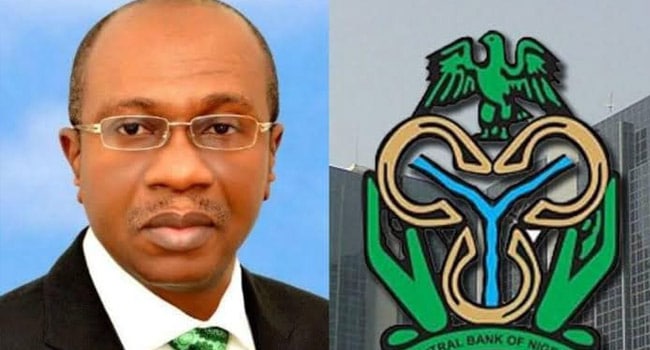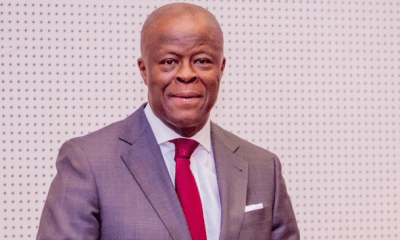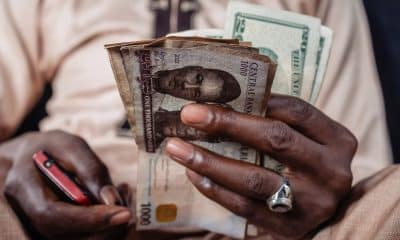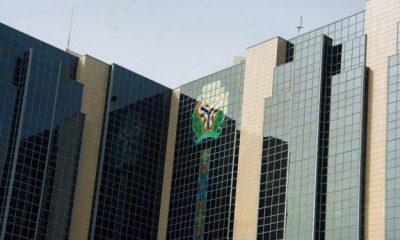Business
CBN’s Cash Withdrawal Limit Commences Today, Experts, Bank Users React

As reliably gathered by Naija News, the Central Bank of Nigeria’s (CBN) policy about the cash withdrawal limits for individuals and companies commences today, Monday 9 January.
It was learnt that the apex bank’s policy concerning the limitation of cash withdrawals which was announced on December 6, 2022, takes effect today.
Naija News understands that going forward the maximum cash withdrawal for individuals and companies per week stands at N500, 000 and N5 million respectively.
And also henceforth, third-party cheques above N100, 000 are no longer eligible for payment over the counter, as they would be paid into bank accounts.
But the CBN clarified that if there is a compelling reason to withdraw cash in excess of the stipulated limits, “such requests shall be subject to a processing fee of three per cent and five per cent for individuals and corporate organisations, respectively.”
This platform gathered that banks yesterday through emailed notices sensitised the public about the implementation of the policy while urging customers to comply with the directive.
In an emailed note to investors, the Managing Director, of Stanbic IBTC Asset Management, Oladele Sotubo, said the policy will be implemented as announced by the CBN.
However, several experts and bank users have reacted to the new reality with some explaining that the CBN means well while others opined that it was a policy to render several jobless especially operators of PoS.
Naija News gathered that a development economist identified as Gabriel Uchenna, told The Nations “It is a good development, and I want to suggest that the CBN implement it in phases. Areas like Lagos, Kano and Port-Harcourt can go first while others may follow. Also, a location modification may come, like in Urban or rural areas.
“N500, 000 is not too small on individual accounts but the issue is that it may force some people to stay completely outside the banking system. If you consider the people in the rural areas who are into commodity trading, they need far more than N500, 000 to trade and if you are telling them that you can only do N500, 000 in a week, these are people who do business to the tune of N3 million in a week because they buy and sell, such people will stay outside the banks and just be doing their business with cash.”
Similarly, the President, of the Bank Customers Association of Nigeria (BCAN), Uju Ogunbunka, submitted to The Nation that “The policy is a good one given the benefits that come from cashless banking, but its timing and implementation process are not practicable based on weak IT infrastructure realities on the ground.
“The policy is good, but the practical realities in the country are against its successful implementation. Nigeria is a cash-driven economy and no matter what anyone thinks, you cannot run away from that trend overnight.
“It is going to be a crisis. Power supply is bad and network connectivity in many rural areas is also bad or non-existent. Taking cash away from them will speed doom for the people.
“What can ₦1, 000 buy? That means people will have to be frequenting the banks to get enough money to buy what they need. How many people spend N100, 000 a week? I am yet to see how a woman selling vegetables will be paid with cash transfer. The CBN needs to strengthen the infrastructure and get banks ready for takeoff.”
Ogunbunka further explained that there were many bank customers who do not believe in online transactions and will not change their minds overnight because of the negative experiences they had with the channels.
He added that the rising cases of e-fraud have frightened many cardholders out of the e-payment platform and returned to cash-based transactions, therefore “Convincing such people into embracing digital payment fully, will not be an easy task that will just happen overnight.”
A lawyer identified as Nkem Oboko also said to The Nation that “It’s a welcome development from the government as this will help curb the amount of money in circulation and cut down on inflation drastically. The ‘stocking and stacking’ of naira notes by politicians and elite will be contained.”
Contrary to Oboko’s view, another lawyer identified as Ada Nwosu, who also operates a thriving Point of Sale (PoS) business in Abuja told The Nation that “The cash withdrawal limit policy would bring nothing but more hardship on Nigerians and also have negative effects on the already bad economy due to the fact that the proper structure has not been put in place, take for instance, the constant network glitches is a huge challenge with the present situation how much more with this new policy.
“In my line of business, being the CEO of a major PoS office, cash being transferred most often than not never gets to their beneficiaries, it is either on hold or it is reversed to the sender or takes hours/days before the beneficiary gets value, now what happens in an emergency (perhaps in a life and death situation) and money is transferred and the hospital that is waiting to get a confirmation before commencing treatment but does not get value due to network glitches and the patience dies? That is on one part.
“On the other part, a lot of villages still do not have good or no network at all despite MTN adverts that says *Anywhere you Go*, and some of these villages are hours away from the closest bank hence, the advent of PoS.
“Some POS are located in the middle of nowhere, how can they render their services with the new policy? What about the rural women and men who do petty trading where normal telephone conversation is almost impossible due to bad network?
“And finally, the economy is so bad and with the prices of things so expensive, N200,000 daily limit is murder.”
Naija News understands that some bank users who bared their minds to The Nation also bemoaned how stressful the new policy who be for the average Nigerian.
For John Nwagwu, he said “it’s a policy that wasn’t properly thought through before implementation. Nigeria is a cash-based society as such implementing policies like that requires a phasing process that is drawn out over a period of time.”
To Mrs Solomon Foluke, “it’s just another way of making life difficult for the public. For instance, I and my husband are not salary earners, we do buying and selling. How are we going to meet up with demands from clients as most of the locals that we get our produce from don’t do transfer but raw cash? It’s not going to work; the CBN needs to forget about it please.”
On her own part, Mrs Olasimbo Abimbola noted that “Though many may think it’s a good idea, but to poor masses it is not a good idea at all. Let’s start from the petty trader that does daily retail sales (fish, tomatoes, yam, et al) as an individual she needs like 200k cash daily to purchase her goods… How is she going to cope? The present situation in Nigeria does not permit this.”
Jerry Okonji said “It’s a great idea. With time, it will inject considerable level of integrity in financial transactions.”
Patience Ikpeme described the policy as “A welcome development. This will help so many business people embrace the idea of mobile banking and this will to an extent reduce theft because nobody will be able to carry cash amount of cash around and criminal activities will easily be traced.”












